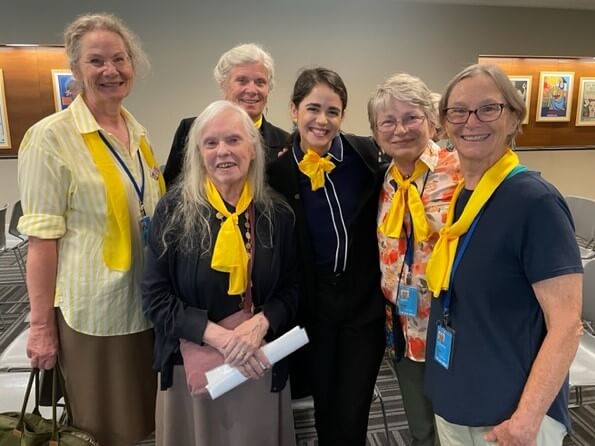The March meetings of the UN Commission on the Status of Women (CSW) have been our advocacy focus since we began developing a presence at the UN in 2019. Our colleague from Bolivia, Carmen Capriles, who was active at the UN long before that, has urged us to attend other events. This year we did just that: The most significant was participation in the High Level Political Forum (HLPF) in July. Then in September, a few of us attended the People’s Assembly, the Sustainable Development Goals (SDG) Summit, and the March to End Fossil Fuels.
The HLPF takes place every year with the task of evaluating progress on the SDGs, which were adopted in 2015 as an agenda to carry the world to 2030. At the HLPF, we had an in-person delegation of six: Lee Boeke-Burke, Tina Huesing, Carol Huston, Hajnal Minger, Debra Pritchard, and Carmen Capriles. This year’s HLPF focused on SDG 6 (Clean Water and Sanitation), SDG 7 (Affordable and Clean Energy), and SDG 17 (Partnerships). We have long known that ICUUW’s mission is most clearly reflected in SDG 5 (Gender Equality), but the discussions here showed us how we could join advocacy efforts for SDG 6 (freedom of action during menstruation) and SDG 7 (use of solar cookers).
In addition to general discussion of progress (or lack of it) on the SDGs, more than 40 countries presented Voluntary National Reviews (VNRs) on their own work on the SDGs. One of the VNR countries this year was Romania. Hajnal and Lee made contact with a Romanian activist and went to a meeting at the Romanian embassy. This kind of access and communication never happens at the CSW, which is much larger (7800 at CSW this year, compared with 2700 at HLPF). We never see members of delegations from member states at CSW, but here, Carol was able to sit near the US delegation during daily sessions and actually spoke briefly with US delegation staff.
We attended meetings of the Women’s Major Group (WMG) every morning, which gave us the ability to network and to learn about what was happening behind the scenes. Major Groups can put speakers on the agenda to respond to plenary presentations, and speakers from the WMG gave us a chance to look at draft statements. Tina added some language to one statement. Carmen was on the list to speak about Water from the NGO Major Group, but time ran out before they reached Carmen’s name. There’s never enough time.
It was really exciting to be there and feel that we were part of a process. We hope that more of you will join us at the UN someday, perhaps for the heady experience of being with thousands of women activists at CSW, or to engage in more specific action during other sessions.
